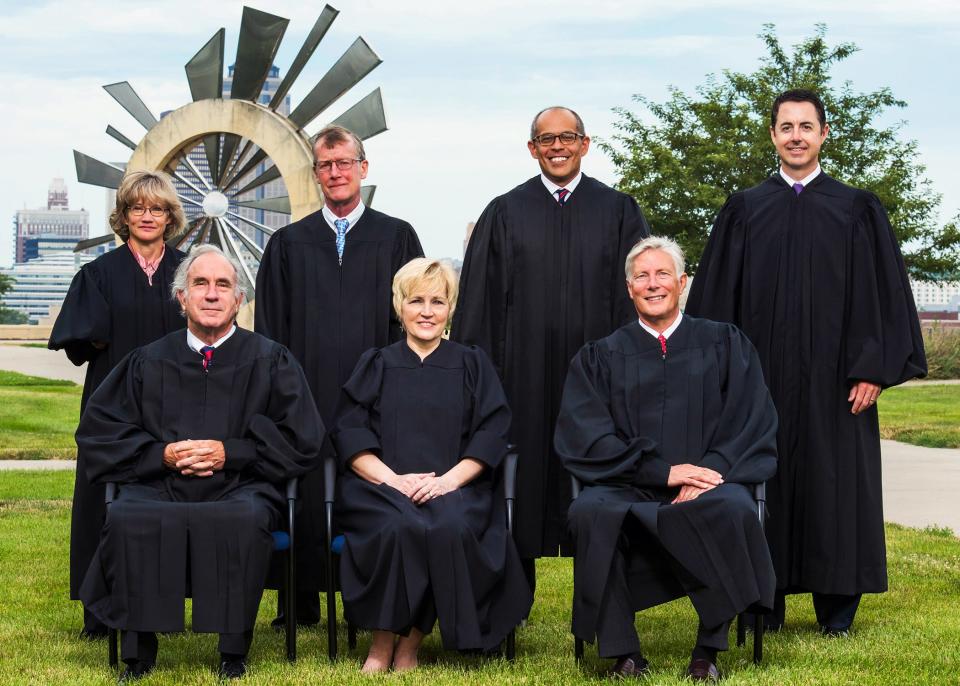Racial disparities, public view of court key issues as commission picks Iowa Supreme Court finalists
Gov. Kim Reynolds will have her choice of two serving judges or a veteran business litigator when she nominates the next justice to serve on the Iowa Supreme Court.
The State Judicial Nominating Commission, a 17-member panel composed of Reynolds appointees and members elected by the state's attorneys, on Monday interviewed the five candidates seeking to replace retiring Justice Brent Appel.
It nominated three for Reynolds' consideration: Iowa Court of Appeals Judge David May, District 1A Judge Alan Heavens of Garnavillo, and attorney William Miller of Des Moines law firm Dorsey & Whitney.

The candidates not chosen as finalists were Chief Judge Patrick Tott of the Sioux City-based Third District Court and Ames attorney Tim Gartin, both repeat applicants to the Supreme Court.
For subscribers: 'No one worked harder:' Colleagues honor retiring Iowa Supreme Court Justice Brent Appel
Monday's interviews come at a time of heightened attention to the court, which on June 17 overturned a 2018 precedent guaranteeing a fundamental right to abortion under the state constitution. The ruling, coming a week before the U.S. Supreme Court overturned Roe v. Wade, will make it significantly easier for legislators to restrict abortion in Iowa, and several candidates were asked to consider the court's public standing under such scrutiny.
May, a finalist for a previous Supreme Court vacancy in 2020, told Commissioner Dorothy O'Brien in a private interview that a major challenge facing the court is perceived politicization. When she asked him about it in the public session, he said courts should defer when they can to the democratically elected Legislature.
"To me the best way to avoid the perception that judges are making up the rules as they go along is, particularly when we talk about democratically produced texts like statutes, to carefully follow those texts and to not substitute our viewpoints for those texts," May said. "... I think my record bears out the 300 cases I've written that I've continuously followed that approach."
May also said judges should exercise restraint in not ruling on unnecessary issues in a case, or "creating law out of our personal preferences, when the law requires something else."
Perceived racial bias in Iowa courts a topic of concern
While Miller and May are both Des Moines residents, Heavens would be the first Justice in several years to hail from northeast Iowa, which he played up in his presentation. He also said he intentionally submitted the shortest writing samples of any candidates because he believes brevity and clarity are essential qualities on the bench.
"I'm thinking about the clients, the parties, the people who my opinion is profoundly affecting their lives," he said. "I've always believed that they should understand why I ruled the way I did, why I am going to have this profound effect on their life."
Another repeated theme Monday was racial disparities in Iowa's justice system, where Black Iowans are imprisoned vastly out of proportion to their share of the population. Commissioner Henry Bevel, who is Black, asked Heavens to expand on a comment that the law "plays out differently" in different districts. Heavens said that while he'd meant differences in local rules and procedure, he said he's deeply aware of the skepticism minorities feel toward the judicial system.
"The stats don't lie," Heavens said. "I think it's fair for African-Americans to wonder, am I being treated fairly by the system?"
Previously: Iowa Supreme Court sides against another defendant arguing lack of Black jurors violated rights
Heavens said he hopes those disparities can be reduced by more training for judges and prosecutors, in particular in taking into account family, education and work background as well as criminal history and severity of the crime when passing sentences.
Miller, a former clerk for then-Chief Justice Mark Cady, emphasized his work on bar associations and other legal organizations as well as his courtroom experience, despite having not served as a judge.
"I think a couple things in my background are beneficial to get into that role, having clerked, and having worked closely with the judiciary over time, but I think like a judge now," he said. "My aim is to anticipate what I need to show the court, to the jury, to others, to think about the angles in mind and analyze issues."
On the question of public perceptions of the court, Miller said justices shouldn't be swayed by those concerns when deciding cases, but said it's important for the court to be open about its role and how it handles disputes. In recent years, starting under Cady, the court has worked to improve public access by holding sessions around the state, and Miller said he would want to continue those efforts.
"We had one point where the court was not talking to the public that much, and I think there's a great opportunity to continue (public outreach) and expand on it," he said.
From 2021: Family Justice Reform Initiative renamed in honor of late Iowa Chief Justice Mark Cady
All Iowa Supreme Court justices will be nominees of Republican governors
With the commission announcing its nominees, Reynolds now has 30 days to announce her selection. It will be her fifth appointment to the court since 2018, a period of rapid turnover, and will result in all seven justices having been appointed by Republican governors.
Justices can serve until they reach the mandatory retirement age of 73. With Appel's impending retirement, the next-oldest justice is Edward Mansfield at 65, meaning that barring early retirements or deaths, it could be more than seven years before another seat comes open on the state's high court.
William Morris covers courts for the Des Moines Register. He can be contacted at wrmorris2@registermedia.com, 715-573-8166 or on Twitter at @DMRMorris.
This article originally appeared on Des Moines Register: Three candidates sent to Gov. Kim Reynolds for Iowa Supreme Court seat


